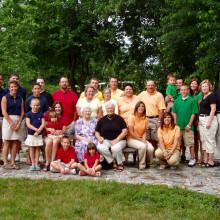Unless you are an identical twin it's unlikely you've found anyone else who looks just like you. But, why do we all look so different? Felicity Bedford spoke to population geneticist Sir Walter Bodmer from Oxford University who is characterising thousands of faces as part of the People of the British Isles Project...
In this episode

00:00 - Why do humans have such a variety of appearances?
Why do humans have such a variety of appearances?
We put Ghayath's question to population geneticist Sir Walter Bodner from Oxford University...
Walter - You've hardly ever, I imagine - unless you're a pair of identical twins, seen anyone who looks just like you do. We are enormously variable in facial features, and we don't definitely know why that is, but it obviously has strong evolutionary basis; there must be something that's selected for that. I think it's part of the way humans have evolved socially that it's been very important to be able to recognise people who are part of your own group, even your own family. There are very special regions of the brain for identifying faces and there are complex processes by which we analyse and discern what it is in a face that we recognise.
Felicity - How much of that variability is down to genetics?
Walter - Well nearly all of it. If you've ever seen identical twins, they've got exactly the same genetic makeup and when you see them the first time, if you're not their parents or anything, they're almost impossible to distinguish from each other and that tells us that the face is very largely genetically determined. You can vary it; you can have blue hair if you want; you can do things to your face if you go to the right sort of surgeon but, by and large, most of the features that we recognise in a face are very much genetically determined.
Felicity - When we look at other animals, we don't pick up on as much variability perhaps in their facial features. Is this something which is unique to humans?
Walter - No I don't think it is, but remember if you go to another country; if you go to Africa or you go to China, you probably don't find it as easy to recognise the facial differences there as you do in your own group. So that's one thing, we don't necessarily know how to recognise that chimps may look very different to each other, so there's undoubtedly a lot of variation there. Of course, if you take domesticated animals like dogs, a lot of variation has been selected for, so I think there is quite a lot of variation out there; most of it we don't quite know how to recognise.









Comments
Add a comment